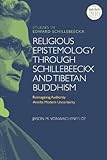Religious epistemology through Schillebeeckx and Tibetan Buddhism : reimagining authority amidst modern uncertainty / Jason M. VonWachenfeldt.
Material type: TextSeries: T & T Clark studies in Edward SchillebeeckxPublisher: London ; New York : T & T Clark, [2021]Description: 1 online resource (viii, 254 pages)Content type:
TextSeries: T & T Clark studies in Edward SchillebeeckxPublisher: London ; New York : T & T Clark, [2021]Description: 1 online resource (viii, 254 pages)Content type: - 9780567698667
- 0567698661
- 9780567698643
- 0567698645
- 9780567698650
- 0567698653
- Schillebeeckx, Edward, O.P., 1914-2009
- Dge-ʼdun-chos-ʼphel, A-mdo, 1903-1951
- Catholic Church -- Relations -- Buddhism
- Dge-ʼdun-chos-ʼphel, A-mdo, 1903-1951
- Schillebeeckx, Edward, 1914-2009
- Catholic Church
- Knowledge, Theory of (Religion)
- Religions
- Buddhism -- Relations -- Catholic Church
- Religions
- Bouddhisme -- Relations -- Église catholique
- religions (belief systems, cultures)
- Buddhism
- Interfaith relations
- Knowledge, Theory of (Religion)
- Religions
- 210 23
- BL51 .V59 2021
- online - EBSCO
| Item type | Current library | Call number | URL | Status | Notes | Barcode | |
|---|---|---|---|---|---|---|---|
 eBook
eBook
|
Biblioteca "Angelicum" Pont. Univ. S.Tommaso d'Aquino Nuvola online | online - EBSCO (Browse shelf(Opens below)) | Online access | Not for loan (Accesso limitato) | Accesso per gli utenti autorizzati / Access for authorized users | (ebsco)2732805 |
Includes bibliographical references and index.
Introduction. The problem of objective "truth" and the threat of relativism for religious practitioners in the modern world -- Comparative theology, religious diversity, and the question of ultimate truth -- The "bridge concept" and its materials -- The histories of individuals, and the context for their ideas -- The roles of individual intellect and the collective intelligence of the community in knowledge formation -- The role of the historical founders of religious traditions in shaping and conveying -- Religious knowledge, meaning, and truth for contemporary believers -- The role and authority of personal experience in the apophatic knowledge of ultimate reality -- Conclusion. Possible Madhyamaka implications for Catholic theology.
"This study investigates how a comparison between the Catholic theologian Edward Schillebeeckx's controversial reading of Thomist philosophy and the Tibetan Buddhist Gendun Chopel's challenge to the standard Geluk teaching of Tsongkhapa's Madhyamaka philosophy might assist in rethinking conceptions of religious knowledge. Jason M. VonWachenfeldt shows how Gendun Chopel's Madhyamaka approach to the questions of knowledge in light of cultural conventionality and historical contingency can possibly better inform a Christian theological response to similar questions of modern society. Utilizing a wide variety of methodical approaches to establish an imaginary dialogue between these two thinkers, this comparison remains embodied in the thought and praxis of actual individuals, and yet still firmly embedded within the conversations and trajectories of their broader religious traditions. The final chapter constructively combines and contrasts the insights of both thinkers regarding the knowability of ultimate truth in order to develop new possible approaches to epistemology that assist the contemporary believer in avoiding the problematic nihilism of a purely subjectivist epistemology-which is so rampant in the contemporary "postmodern" milieu-while still always maintaining and sharpening the practitioner's humility towards discourses on metaphysics through the critical eye of a deconstructive apophaticism"-- Provided by publisher
Description based on online resource; title from digital title page (viewed on July 23, 2021).


